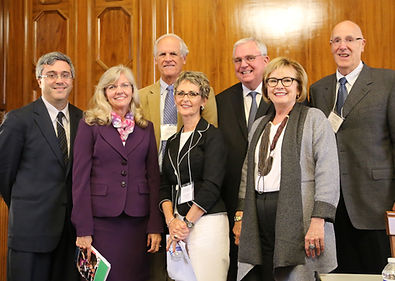


The California Task Force on K-12 Civic Learning was commissioned in 2013 by California Supreme Court Chief Justice Tani Cantil-Sakauye and State Superintendent of Public Instruction Tom Torlakson. A year later, the task force released what remains a "blueprint for action."
The recommendations outlined in the report were submitted to:
-
Chief Justice of California
-
State Superintendent of Public Instruction
-
State Board of Education
-
Chair of the Assembly Education Committee
-
Chair of the Senate Education Committee
The Chief Justice appointed the Power of Democracy Steering Committee to develop recommendations for the judicial branch, which has since evolved into a statewide initiative under Chief Justice Patricia Guerrero.
“California’s current civics classes emphasize memorization over participatory skills,” and relies on a 12th-grade government course that comes too late for students already disengaged from school, the report said.
The bolded recommendations below are areas where the judicial branch is helping move the mark through the Chief Justice's Power of Democracy Civic Learning Initiative.
To this end, the Task Force makes the following system-wide recommendations to improve civic learning in every district, in every school, for every child:
• Revise the California History-Social Science Content Standards and accompanying curriculum frameworks to incorporate an emphasis on civic learning, starting in kindergarten, so all students acquire the civic knowledge, skills, and values they need to succeed in college, career, and civic life.
• Integrate civic learning into state assessment and accountability systems for students, schools, and districts. Civic knowledge, skills, and values, and whether students are receiving learning opportunities that promote these outcomes, must be assessed and linked to the revised California History-Social Science Content Standards and relevant Common Core State Standards. This will enable periodic reporting to the legislature and the public on the state of students’ civic learning.
• Improve professional learning experiences for teachers and administrators to help them implement civic learning in schools. Connect professional learning in civics to Common Core State Standards.
• Develop an articulated sequence of instruction in civic learning across all of K-12, pegged to revised standards. At each grade level, civic learning should draw on the research-based Six Proven Practices listed above and include action-oriented, project-based work that develops digital literacy.
• Establish a communication mechanism so community stakeholders can easily connect with teachers and students on civic education and engagement. Students need to leave the school building to practice civic engagement, and civic leaders need to enter schools to engage students.
• Provide incentives for local school districts to fund civic learning in Local Control Accountability Plans under the new LCFF.
These recommendations constitute a comprehensive plan. The report provides a detailed description of the context and rationale, elaborates on the recommendations, shares civic learning success stories from around the state, and offers actionable steps we can all take immediately to significantly improve the quality of civic learning in our schools.
